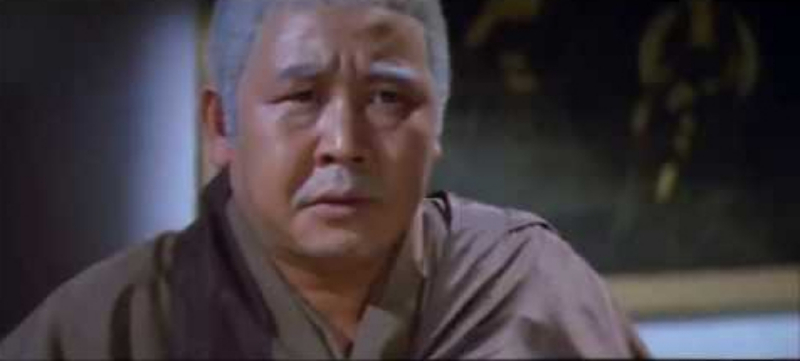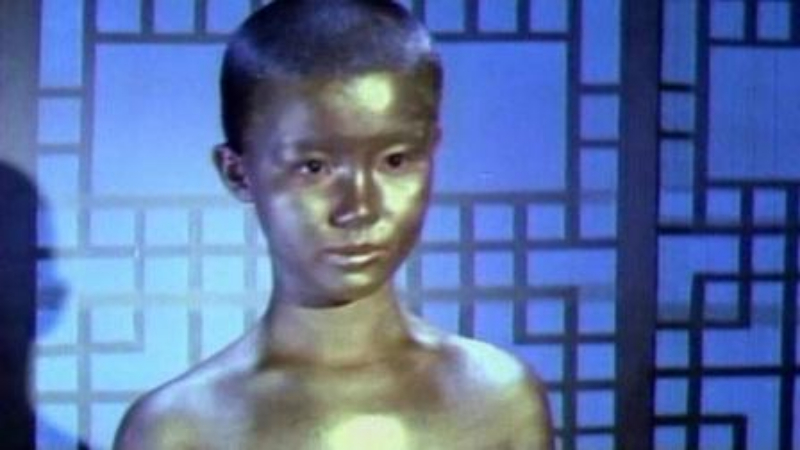Director – Kim Ki-young – 1974 – South Korea – 111m
*****
Buddhist, monastic drama. Celibacy confronts carnal desire and a new senior monk must be chosen as the incumbent nears death.
Free to view in the Korean Film Archive as part of
Korean Film Nights Online: Trapped! The Cinema of Confinement
(Friday, July 17th – Thursday, August 27th)
Viewing links at bottom of review
From its opening, a lengthy shot of a mountain hillside slope, this throws anyone unfamiliar with the more complex tenets of Buddhism in at the deep end, peppering voice-over and dialogue with words like ‘yulseong’ (“a monk that learns Buddha’s words”), ‘seonseong’ (“a monk that tries to emulate Buddha’s mind”) and ‘hwadu’ (“a kind of question that leads to seon”). A student disguises himself as a monk to gain admission to a Buddhist temple and see for himself what goes on there.
The temple monks meet to discuss their food problem. There are fifty older monks of more than twenty years’ standing and twenty younger newcomers. One of the old monks Doshim stole and sold some of the temple food. Another old monk tells newcomers that old monks are treated badly at the monastery, suffering deprivation of food, sleep and clothes. Children certainly are because orphans who’ve crossed a war zone get strung up by their shoulders when caught stealing food from the kitchen.
Monks visit their leader to explain where they’re from (making animal noises to indicate their form in a previous life) and be given such hwadu as, “what is the total weight of the stars in the sky” then get struck with a big wooden paddle when they don’t know the answer before being sent away to meditate. One is banished for farting in the senior monk’s presence, but afterwards the senior admits the fart demonstrates the monk’s enlightenment. Chimhae wants his friend Doshim admitted back into the monastery so is ordered to go and get him.
On his travels, Chimhae visits the nearby Sowon Temple where he tricks female monk Myohon into swearing she’ll be his sister while she’s unaware he’s a man. After curing her of her talking hand using acupuncture, she berates him for stealing her sounds. Their relationship continues throughout the narrative, a chaste affair based on the desire on both their parts to remain sexually pure, consummated, as it were, by touching fingers then cutting them off to prove their purity. This comes from the same mindset as the female monk who tests the purity of male monks by attempting to seduce them then insists they castrate themselves when they fail.
Myohon is given a red dress with flared arms, a gift left her by her mother, and cavorts outside in it as Chimhae watches near a burial temple for monks who were beaten to death so that they might reincarnate. By the time Chimhae is brought back to his own monastery, he is barely conscious and hallucinating himself pursuing Myohon as she flaps her arms, runs along the riverbank and cavorts inside a cage made of sharpened wooden poles.

With the senior monk nearing death, a replacement needs to be chosen to wear the monastery’s mantle, the sign of leadership. Proposed tests include fasting for ten days and jumping off a cliff. The senior monk decides to test with women, since the old monks never had that experience. He asks Myohon to remove clothing so he can see if his own celibacy was the right decision. Also, to test Chimhae who’s sitting next to him. She agrees because it’s for the mantle.
Naked, Myohon is momentarily transformed (by judicious editing and camera angles so the camera never really sees anything of her nudity) into a figure with gold-painted skin. Chimhae states that only the old see women as a temptation, the young see them as equal, so he too removes is clothing to stand with her. Yet the senior monk denies him (and her request for him for) the mantle. After a seizure the senior is ceremonially covered with a shroud.
Chimhae and Myohon find themselves back at the burial temple. He removes first her monk’s clothes, then the red dress which she says is a symbol of death. Also, the senior monk wanted her and Chimhae to be together. She tells him he needs to face death seven times to achieve enlightenment. Being a woman she can be his guide for that. Her open mouth, his open eyes, her head arched back in ecstasy, she cavorts (camera sideways) in the red dress, arms flapping like a butterfly. Eventually, she will turn around and fly down the screen to her death.
Watching the film is a strange experience. Director Kim is undoubtedly a master of the cinematic art, yet sometimes in this particular film the way he puts scenes or even shots together can be as baffling as some of the hwadu asked of the monks. This film will repay numerous viewings and re-viewings. Its portrait of religious sensibilities, cut off from the outside world in the monastery, does indeed speak to the situation of isolation that the current film season seeks to address. And as a primer on Buddhism, it’s as good a place as any to start.
Transgression is available free to view in the UK in the Korean Film Archive as part of
Korean Film Nights Online: Trapped! The Cinema of Confinement
(Friday, July 17th – Thursday, August 27th)
Intro:
Movie (subtitled version has been removed from the Korean Archive Channel since this review was written; unsubtitled version below):
Korean Film Nights Online: Trapped! The Cinema of Confinement will be hosted on the koreanfilm website as well as the KCCUK YouTube channel. The recorded introductions will be live at 7pm in a playlist followed by each film, from the Korean Film Archive channel. More info here. http://koreanfilm.co.uk/news/trapped-the-cinema-of-confinement
17/07 – 301/302. Park Chul-Soo (1995) 98m.
30/07 – Eunuch. Shin Sang-Ok (1968) 95m.
13/08 – Transgression. Kim Ki-young (1974) 111m.
27/08 – Sopyonje. Im Kwon-Taek (1993) 113m.
